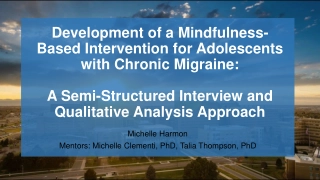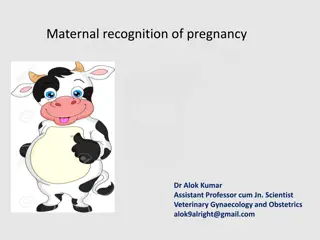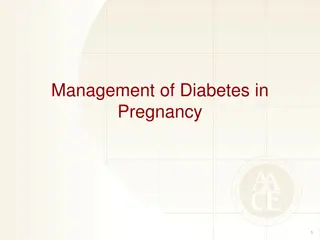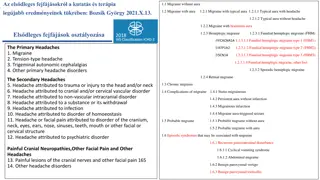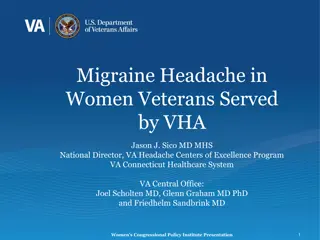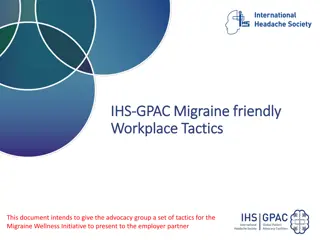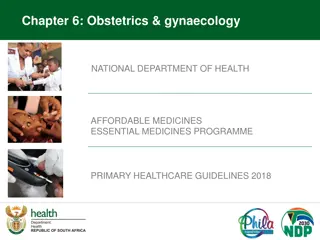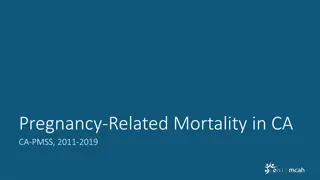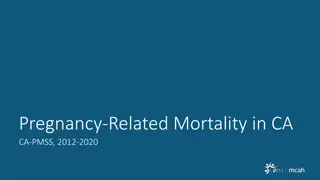
Impact of Migraine on Pregnancy Planning Insights
Explore how migraine impacts pregnancy planning, highlighting insights from the American Registry for Migraine Research. Discover why some individuals with migraines avoid pregnancy and the importance of educating them about potential improvements during pregnancy.
Uploaded on | 1 Views
Download Presentation

Please find below an Image/Link to download the presentation.
The content on the website is provided AS IS for your information and personal use only. It may not be sold, licensed, or shared on other websites without obtaining consent from the author. If you encounter any issues during the download, it is possible that the publisher has removed the file from their server.
You are allowed to download the files provided on this website for personal or commercial use, subject to the condition that they are used lawfully. All files are the property of their respective owners.
The content on the website is provided AS IS for your information and personal use only. It may not be sold, licensed, or shared on other websites without obtaining consent from the author.
E N D
Presentation Transcript
SLIDE KIT THIS ACTIVITY IS SUPPORTED BY AN EDUCATIONAL GRANT FROM LILLY For further information concerning Lilly grant funding visit www.lillygrantoffice.com www.lillygrantoffice.com
SLIDE KIT The Impact of Migraine on Pregnancy Plan: Insights from the The Impact of Migraine on Pregnancy Plan: Insights from the American Registry for Migraine Research (ARMR) American Registry for Migraine Research (ARMR) Presented by Ryotaro Ishii, MD, PhD Mayo Clinic Scottsdale, Arizona Developed by Infomedica Medical Education& Information AHS Virtual Annual Scientific Meeting content is made available to an international audience through a licensing agreement between Infomedica and the American Headache Society. Infomedica is an independent medical education provider that delivers medical information to healthcare professionals through conference coverage and online educational programs and activities.
A M E R I C A N H E A D A C H E S O C I E T Y V I R T U A L A N N U A L S C I E N T I F I C M E E T I N G O F F I C I A L H I G H L I G H T S Key messages Previous studies have focused upon the impact of pregnancy on migraine patterns, but there is a large migraine burden on pregnancy planning. In particular, migraine impacted the pregnancy planning of the young, those with menstrual migraine, chronic migraine and those without children. Migrainous females avoided pregnancy because they believed their migraine pattern would worsen during pregnancy and make their pregnancy difficult. Previous observations showed most women have migraine improvements during pregnancy. The education of migrainous females about the impact of pregnancy on their disease is important. DEVELOPED BY
A M E R I C A N H E A D A C H E S O C I E T Y V I R T U A L A N N U A L S C I E N T I F I C M E E T I N G O F F I C I A L H I G H L I G H T S Background What do we already know about this topic? Migraine negatively affects a patient s quality of life during and between attacks, impacting their career, social activity and relationships. Previous studies have shown approximately 1% of females with migraine had fewer children or avoided having children, while 3.2% chose not to have children, delayed or had fewer children due to migraines.1,2 The American Registry for Migraine Research (ARMR) is a multicenter registry of patients diagnosed by a specialist according to the International Classification of Headache Disorders-3 (ICHD-3).3 DEVELOPED BY
A M E R I C A N H E A D A C H E S O C I E T Y V I R T U A L A N N U A L S C I E N T I F I C M E E T I N G O F F I C I A L H I G H L I G H T S Background How was this study conducted? The ARMR database was used to identify female patients with any migraine diagnosis who had completed the pregnancy planning questions between February 2016 and September 2019 (N=1112). Excluded patients with trigeminal autonomic cephalalgias (TACs), secondary headache, painful cranial neuropathies, other facial pain and other headaches. Data was subdivided into Avoid Pregnancy (AP) and No Impact (NI) groups based upon the response to a closed question regarding migraines impacting pregnancy plans. DEVELOPED BY
A M E R I C A N H E A D A C H E S O C I E T Y V I R T U A L A N N U A L S C I E N T I F I C M E E T I N G O F F I C I A L H I G H L I G H T S Findings What does this study add? 19.9% females with a migraine diagnosis avoided pregnancy to some extent because of migraine. The AP group was significantly younger than the NI group and had significantly fewer children. Compared to the NI group, the AP group had a higher proportion of chronic migraine, menstrual migraine, depression, frequency of headache days and higher Migraine Disability Assessment (MIDAS) scores. In the AP group, 72.5% believed migraine would worsen during pregnancy and 68.3% believed migraine would make their pregnancy very difficult. There was no significant difference in sociodemographics between the AP and NI groups. DEVELOPED BY
A M E R I C A N H E A D A C H E S O C I E T Y V I R T U A L A N N U A L S C I E N T I F I C M E E T I N G O F F I C I A L H I G H L I G H T S Perspectives How does this study impact clinical practice? As previous observations have shown, most women have migraine improvements during pregnancy, it is important to educate women with migraine about the true impact of pregnancy on their disease. Due to the paucity of studies, further research is required on the impact of migraine on pregnancy plans of female patients with a history of migraine. DEVELOPED BY
A M E R I C A N H E A D A C H E S O C I E T Y V I R T U A L A N N U A L S C I E N T I F I C M E E T I N G O F F I C I A L H I G H L I G H T S References 1. Lampl C, Thomas H, Stovner LJ, et al. Interictal burden attributable to episodic headache: findings from the Eurolight project. The Journal of Headache and Pain 2016;17:9. 2. Buse DC, Fanning KM, Reed ML, et al. Life With Migraine: Effects on Relationships, Career, and Finances From the Chronic Migraine Epidemiology and Outcomes (CaMEO) Study. Headache 2019;59:1286-1299. 3. Schwedt TJ, Digre K, Tepper SJ, et al. The American Registry for Migraine Research: Research Methods and Baseline Data for an Initial Patient Cohort. Headache 2020;60:337-347. DEVELOPED BY

